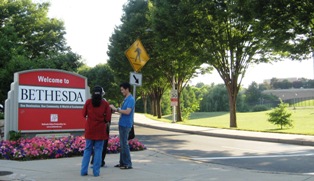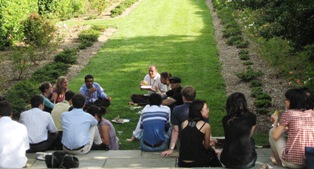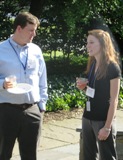Fogarty Scholars train here and abroad
July - August, 2008 | Volume 7, Issue 4
"This place is amazing...everything is amazing," said Zambian David Linyama, reflecting on his first four days at the NIH campus and his first visit to the United States.

Three visiting International Clinical Research Scholars
get their bearings as they start a two-week orientation.
Linyama, one of 96 American and foreign pre- and post-doctoral global health scholars selected for 12 days of intense training on campus and 10 months of research and training abroad, said he was overwhelmed by how
smoothly traffic and the subway system ran. When that produced an "are-you-kidding?" look from a veteran of Rockville Pike traffic, Linyama chuckled, "Spend a few hours in Africa."
The Mozambique-born general surgeon will have more difficult challenges than mere traffic jams back in Lusaka, where, under sponsorship of the Fogarty International Clinical Research Scholars and Fellows program, he and American medical students will be trying to introduce and promote neonatal circumcision as a long-term AIDS preventative.
Under the program, U.S. post-graduates--mostly third-year medical, dental or veterinary students--are paired with foreign counterparts, and they conduct clinical research together abroad under the tutelage of NIH-funded universities or other research institutions working on infectious or chronic diseases.
Similarly, post-doctoral trainees are paired but they are expected to develop their own research projects. After two weeks on campus, the 96 trainees from 23 states and 20 foreign countries were dispatched to 25 sites.
It is a blend of the personal--wanderlust, bravado, the romance of medicine--or the imperative to put one's brains and technical skills to use where they will do the most good that brought such a diverse collection of talent here, by far the largest class of the six-year-old program.

Scholars having a barbecue in the garden at the
Stone House.
"I grew up moving around the world and was always interested in global things," said Marjory Bravard, a Tufts University medical student, whose next stop is Lima, Peru.
For Brock Daniels, a high school athlete and poet and now a Northwestern medical student, "the travel (interest) came first; medicine came later...You see the world differently, and once you see the world differently you have no choice but to help where you can." He hopes the Fogarty experience will launch his career because "it gives you street cred in international health."
Although chronic diseases are now emerging as a global health threat, the scourge of infectious diseases remains the magnet for most of the idealistic young medical students from America.
For the foreign students, Fogarty offers a chance to help them help their own people and, ideally, to make careers in their home countries.
Jing Li, from a small town in the economically lagging Anhui province of China, is pursuing a Ph.D. in epidemiology and is headed to Nanjing, where she will focus on educating people about syphilis.

Scott Peterson and Vanderbilt
University program coordinator
Tiffany Patterson at the
barbecue.
Stephane Morriseau, a community health graduate of St. Louis University, had been head of dental services at Haiti's primary care clinics for those infected with HIV. His research will be on the link between AIDS and pediatric dental problems caused by certain medications or compromised immunity.
Cesar Bocangel wants to combine his medical and business degrees to help advance living conditions in his native Peru, where he will be training to do further research into Chagas disease.
Latin America has one of the higher Caesarean section rates in the world, and Agustina Mazzoni, an ObGyn from Argentina, and Nancy Liu, a clinical psychology Ph.D. student from the University of Nebraska, want to learn how Argentine women decide whether to have a C-section.
Aissata Ongoiba, a physician from Mali, is now training at Bamako University to further her previous work on defeating malaria. The difficulty, she says is, "Some people don't like using nets. They say, 'They make me hot,' and they don't see the connection between mosquitoes and malaria."
What did these already accomplished doctors, scientists, students and Samaritans get out of the program?
"It felt a bit like I was being inaugurated into a great movement and an elite culture of people." said Jenifer Compton, a medical student at Oregon Health and Science University.
Tanzanian physician and scientist Marina Njelekela, said "the sessions were very educational, interesting and very practical and in line with health problems in low- to middle-income countries."
University of Utah nursing doctoral student, Sarah Iribarren, exulted: "I was most astounded by the caliber of speakers, all leaders or heads of departments in their area of expertise, and more so by their graciousness, approachability and earnest interest in sharing their knowledge with enthusiasm."
To view Adobe PDF files,
download current, free accessible plug-ins from Adobe's website.
Related Fogarty Programs